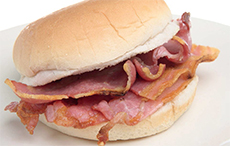ISSUE 19 ARCHIVE - HEALTHY EATING AND DIVING
Dr Oli Firth
It is a truth universally acknowledged that a diver about to embark on a morning dive must be in search of a good bacon butty. Ah the bacon butty, nothing causes more acrimonious arguments than the composition of the perfect bacon sandwich. Food researchers at Leeds University even created a formula to settle the debate once and for all!
One thing is certain, however: bacon butties, beers and between– dive sweets do not a fit diver make and you don't need to be a top university researcher to see that.
If you want to put your body into the high pressure, alien environment of the deep, it is probably best to feed it some fuel that it can work with effectively. With many years
of diving experience circulating at LDC & MDC, we have had the occasion to learn through trial and (many a time) error, as well as hearing from patients, what it takes to have a pleasant day of diving. It should also not be ignored that what you eat could be the difference between a good, safe dive and what could potentially result in a contributing factor to decompression sickness. Whilst we are not asking you to stick to a religiously strict and mundane diet of rabbit food and water for the rest of your diving days, in our capacity as a professional diving medical facility, we would like to offer some guidance and gentle nudges in the right direction. Healthy divers mean happy divers, and happy healthy divers make a happy dive doctor... Ok so what follows here are some top tips for essential diver fuelling...
One week before the dive:
- Now is the ideal time to build your water and carbohydrate stores. The emphasis here is on the ‘water'. Being well hydrated is vital in preventing DCI so it is a must to drink plenty of fluid so that your urine is copious and clear.
- Excessive alcohol intake will dehydrate one rapidly and from copious personal experience it can take a day or two to recover properly from becoming dehydrated.
- Go for complex carbohydrates like whole grains; whole-wheat pasta, sweet potatoes, brown rice, nuts and plenty of veggies for a source of dietary fibre and slow releasing energy. These will keep you feeling fuller for longer and provide a steady supply of blood sugar to maximize energy levels whilst you are diving.
- Protein is also very important for diver fuel, aim for low fat diary products plus lean meat and fish.
Two days before the dive:
- This is the time to make sure that you have plenty of water in your system and plenty of calories. Calories are especially important if you are doing repetitive dives.
- If heading abroad don't be tempted to gorge on alcohol and snacks on the aeroplane, the alcohol acts as a diuretic, directly causing dehydration. In addition, the dry atmosphere of the aeroplane cabin can cause significant fluid loss.
One day before the dive:
- Do not slip into the trap of overeating on the day before the dive and do try and avoid the bad eating habits you may have picked up if you have to travel to the dive site or trip.
- Ideally I would suggest aiming to drop your calorie intake slightly on the day before the dive, but by no more than 500 calories.
- Steering clear of fatty foods will help to avoid that heavy- stomached lethargic feeling on dive day.
Dive Day:
- Try to keep portions small to avoid burping and excess gas and eat
at least two hours before the dive.
- Some foods may make you feel uncomfortable on a dive – commonly, greasy or hot and spicy dishes – so these are best avoided.
- Always keep hydration at the
top of your list on dive day, much like equalizing, the best way to hydrate is ‘little and often'. Aim to drink at least 2 litres of water during the course of the day, more if it is warm weather. This will help to reduce muscle cramps and fatigue, and also helps to decrease the risk of DCI.
- Diluted juice is better absorbed than plain water, and if the squits are in full effect then rehydration solution is better still. If there are none available litre of water, you can make your own: eight teaspoons of sugar and one teaspoon of salt in a litre if water (a squeeze of orange or lemon makes it more palatable).
After the dive:
- After a dive, you need to replace the energy you have burned with foods that release energy into your blood relatively quickly, such as refined carbohydrates like pasta and rice; potatoes; fresh fruit; white bread or bagels.
- Bananas and sports bars are also a good source of immediate replenishment.
- Have something to eat within an hour of surfacing, if possible.
- Energy replacement drinks are a quick fix but avoid those with a high caffeine content.
While following these tips might not turn you into Superman, allow you to dive to greater depths on your next dive or miraculously use less air whilst you're down there, it will make a big difference as to how you feel during and after your dives. Eating sensibly and focusing on hydration can also help to considerably lower your risk of DCI. Plus a trimmer physique might make that wetsuit a little more camera friendly!










